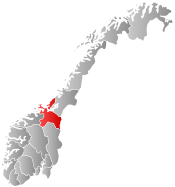Tydal
| Tydal kommune | |||
|---|---|---|---|
| Municipality | |||
|
| |||
| |||
 Tydal within Sør-Trøndelag | |||
| Coordinates: 63°1′6″N 11°48′54″E / 63.01833°N 11.81500°ECoordinates: 63°1′6″N 11°48′54″E / 63.01833°N 11.81500°E | |||
| Country | Norway | ||
| County | Sør-Trøndelag | ||
| District | Neadalen | ||
| Administrative centre | Ås | ||
| Government | |||
| • Mayor (2007) | Kari Slungård (V) | ||
| Area | |||
| • Total | 1,329.21 km2 (513.21 sq mi) | ||
| • Land | 1,217.05 km2 (469.91 sq mi) | ||
| • Water | 112.16 km2 (43.31 sq mi) | ||
| Area rank | 69 in Norway | ||
| Population (2010) | |||
| • Total | 859 | ||
| • Rank | 415-416 in Norway | ||
| • Density | 0.7/km2 (2/sq mi) | ||
| • Change (10 years) | -9.5 % | ||
| Demonym(s) | Tydaling[1] | ||
| Time zone | CET (UTC+1) | ||
| • Summer (DST) | CEST (UTC+2) | ||
| ISO 3166 code | NO-1665 | ||
| Official language form | Bokmål | ||
| Website |
www | ||
|
| |||
Tydal is a municipality in Sør-Trøndelag county, Norway. The administrative centre of the municipality is the village of Ås. Other villages include Østby, Gressli, Aunet, and Stugudalen. There is a school and a kindergarten in Tydal.
The approximately 850 inhabitants in Tydal earn a living in farming, forestry, energy production, and tourism. During Easter, the number of people in Tydal increases by up to 5,000 people. Many people from Trondheim celebrate their holidays in the 1,400 cabins located throughout the municipality of Tydal.
General information
The municipality of Tydal was established on 1 January 1901 when it was separated from the large municipality of Selbu. The initial population of Tydal was 881. The municipal borders have not changed since then.[2]
Name
The municipality (originally the parish) is named after the Tya River. The first element of the name Tydal comes from the Old Norse: Þý, the old river name, which has no known meaning, and the last element (Old Norse: dalr) is means "valley" or "dale". The name was historically spelled Thidalen or Tydalen.[3]
Coat-of-arms
The coat-of-arms is from modern times; they were granted on 7 February 1997. It shows three gold Anthony's crosses on a red background. This was chosen to represent a power line and the letter T, representing the name of the municipality and the importance of hydroelectric power generation in Tydal.[4]
Churches
The Church of Norway has one parish (sokn) within the municipality of Tydal. It is part of the Deanery (prosti) of Stjørdal and the Diocese of Nidaros.
| Parish (Sokn) | Church Name | Year Built | Location of the Church |
|---|---|---|---|
| Tydal | Tydal kirke | 1696 | Aunet |
| Stugudal kapell | 1957 | Stugudalen |
Geography
Tydal covers an area of 1,330 square kilometres (510 sq mi). The rivers Tya River and Nea River (together forming the Nea-Nidelvvassdraget watershed) flow through Tydal on their way towards the Trondheimfjord. Tydal is situated about 260 metres (850 ft) above sea level, and the highest mountain is 1,762 metres (5,781 ft) tall.
In the southwest, the lake Nesjøen lies just west of the Sylan mountain range with the mountain Storsylen. In the north, the Skarvan and Roltdalen National Park is home to the mountain Fongen.
Transportation
Tydal is halfway between Røros and Trondheim, with Norwegian national road 705 as the most important road through Tydal. Trondheim Airport, Værnes is one hour of driving away. There are daily bus connections to Trondheim, Værnes as well as to Røros.
References
- ↑ "Navn på steder og personer: Innbyggjarnamn" (in Norwegian). Språkrådet. Retrieved 2015-12-01.
- ↑ Jukvam, Dag (1999). "Historisk oversikt over endringer i kommune- og fylkesinndelingen" (PDF) (in Norwegian). Statistisk sentralbyrå.
- ↑ Rygh, Oluf (1901). Norske gaardnavne: Søndre Trondhjems amt (in Norwegian) (14 ed.). Kristiania, Norge: W. C. Fabritius & sønners bogtrikkeri. p. 392.
- ↑ "Kommunevåpen" (in Norwegian). Tydal kommune. Retrieved 2008-10-28.
External links
| Wikimedia Commons has media related to Tydal. |
 Sør-Trøndelag travel guide from Wikivoyage
Sør-Trøndelag travel guide from Wikivoyage- Municipal fact sheet from Statistics Norway


